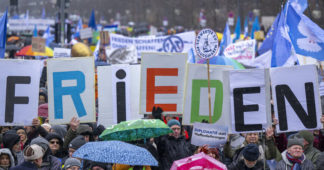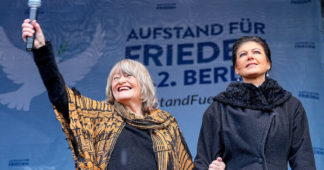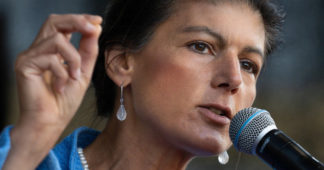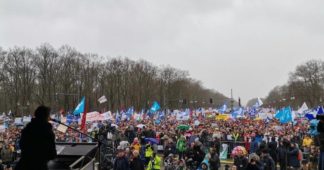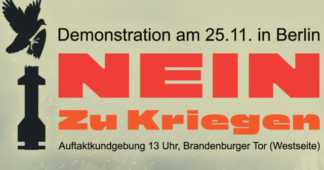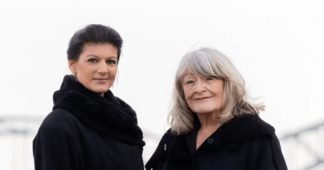Berlin: Thousands at rally and demonstration. Declaration of war on the course of war and rearmament.
By Nico Popp
In the end, the technology went on strike: when the last speaker had said a few sentences, the loudspeakers were suddenly without power and the stage was in the dark. Many people who had come to the peace rally on the west side of the Brandenburg Gate at 1 p.m. on Saturday and had taken part in the short demonstration through the government district were already on their way home at this point. Those who stayed on after more than three hours in temperatures just above freezing and with darkness falling bridged the technical breakdown by singing the protest song “We shall overcome”.
The demonstration under the slogan “No to wars – stop the arms madness – shape a peaceful and just future” was the second major attempt by the German peace movement, which is still on the ground, to show its presence on the streets again in view of the ongoing war in Ukraine, the German government’s war and armament policy and now the current escalation in the Middle East. This time, fewer people came than in February – but if, as was emphasized by various speakers on Saturday, this demonstration is above all a beginning, then the overall response was rather encouraging. It should also be noted that this time there were no attempts from the right to force their way into the demonstration. The organizers had made it clear in advance that “racism, anti-Semitism, fascism and all forms of group-related misanthropy” had “no place” at this event.
The organizers, who counted more than 20,000 participants (the police said 10,000), expressed their satisfaction with the “great success” in a statement in the afternoon. The day showed that the peace movement was growing stronger: “This encourages us to continue with even more commitment.” The German government must campaign for an immediate ceasefire in Ukraine and also in the Middle East. With regard to the situation in Germany, the statement continued: “We will not allow ourselves to be forced into a relapse into German ‘bellicosity’ and will resolutely oppose the agitation and enemy image constructions of Minister Pistorius and so-called experts such as Masala and Münkler.”
Member of the Bundestag Sahra Wagenknecht, who spoke right at the beginning of the rally on Saturday, described the demand by Defense Minister Boris Pistorius (SPD) that Germany must become “fit for war” as “sheer madness”. “What has become of Willy Brandt’s party,” she exclaimed. Among other things, Wagenknecht criticized the recent increase in the billions earmarked for arms deliveries to Ukraine. With the Greens, she said, it was hard to imagine that the party had once emerged from the peace movement. Referring to Foreign Minister Annalena Baerbock, she said that “this woman” had recently declared that it was not the task of politics to ensure that weapons remained silent. Wagenknecht called this an “absurdity”. Against the backdrop of the Israeli attacks on the Gaza Strip, Wagenknecht explained that Germany’s special responsibility for Jewish life and Israel’s right to exist “does not oblige us to gloss over and support the Netanyahu government’s ruthless warfare as self-defense”.
Journalist Gabriele Krone-Schmalz spoke after Wagenknecht. She said she no longer wanted to accept the “unabashed war cries” and had the impression that the majority of people wanted less war rhetoric and “more serious diplomatic activities”. “Our democracy is not being defended in Ukraine – any more than it was in the Hindu Kush,” said Krone-Schmalz. This battle is taking place “within our national borders”. She received a lot of applause for this – also when she expressed the hope that young people, who are currently showing great commitment against climate change, “discover the topic of peace”.
The two speakers were followed on Saturday by former SPD member of the Bundestag Michael Müller, former UN diplomat Michael von der Schulenburg, Iris Hefets from the Jewish Voice for a Just Peace in the Middle East and lawyer Nadija Samour.
Journalist Gabriele Krone-Schmalz spoke after Wagenknecht. She said she no longer wanted to accept the “unabashed war cries” and had the impression that the majority of people wanted less war rhetoric and “more serious diplomatic activities”. “Our democracy is not being defended in Ukraine – any more than it was in the Hindu Kush,” said Krone-Schmalz. This battle is taking place “within our national borders”. She received a lot of applause for this – also when she expressed the hope that young people, who are currently showing great commitment against climate change, “discover the topic of peace”.
The two speakers were followed on Saturday by former SPD member of the Bundestag Michael Müller, former UN diplomat Michael von der Schulenburg, Iris Hefets from the Jewish Voice for a Just Peace in the Middle East and lawyer Nadija Samour.
In terms of mobilization, some things were different this time than in February. There was no wild campaign in the major media against the event and its allegedly “openly right-wing” organizers; on the contrary, the demonstration was hushed up this time. The Left Party, whose leadership had participated in the counter-campaign in February and actively demobilized, also acted more flexibly. While the leadership of the Berlin state association did not lift a finger to mobilize for the demonstration, the federal leadership tolerated the mobilization from individual grassroots organizations and district associations as well as the support of the original call by prominent members of the party. One of the party’s deputy chairmen – Ates Gürpinar – spoke at the final rally. The party leadership also issued its own appeal a few days before the demonstration.
One factor in this modified positioning is likely to be the consideration that those comrades who continue to quarrel with the party over its role in the campaign against the February demo need to be shown something. This may become important in January, when many will be asking themselves whether they should join the new “Wagenknecht Party” or remain in the Left Party.
The trade union leaders are not concerned with such tactical subtleties. The trade unions once again stood on the sidelines on Saturday. They did not call for the demonstration, and most of the individual signatories of the original call who came from the trade union spectrum were former functionaries.
And there was something else that stood out on Saturday: Apart from a bloc of the Federation of Democratic Workers’ Associations (DIDF), there was almost no visible participation of migrant organizations in this demonstration. A peace movement that really wants to reach the population and bring masses onto the streets will have to work to change this.
https://www.jungewelt.de/artikel/464533.friedensbewegung-f%C3%BCr-den-frieden-in-die-k%C3%A4lte.html
Translated with www.DeepL.com/Translator (free version)
Thousands join protests across Germany to demand an end to Gaza genocide
Nov 24, 2023
The major powers continue to fully support the Netanyahu regime and its murderous war against the Palestinians in Gaza. Millions of people around the world have been protesting against this for more than a month.
In Germany, too, many thousands are defying the pro-Israel stance of the Social Democrat-led Federal Government and Bundestag (parliament), to participate in pro-Palestine demonstrations.
In Berlin, a demonstration of more than 5,000, including whole families with children, moved from the main train station to the Großer Stern on Saturday afternoon. Slogans included “Freedom for Gaza,” “Freedom for Palestine,” and “Germany finances, Israel bombs.” Another chant was, “The German media is lying, don’t let them deceive you!” At 4:00 p.m., out of respect for the victims in Gaza, the entire demonstration was transformed into an impressive silent march for 15 minutes.
A large police force was present. The lead organiser of the demonstration stated at the outset to applause: “We are not here to show hatred, but peace. We are not here because we hate Jews—we are here because we stand up against injustice in Palestine. We have lived peacefully alongside the Jews in the Middle East for centuries.” Protests have been taking place each week in the German capital.
People also took to the streets in many other cities last weekend. There were about 1,000 in Leipzig, over 2,000 in Stuttgart and more 1,500 in Düsseldorf. In Hamburg, all protests against Israel’s ethnic cleansing have been banned for five weeks. “Pro-Palestinian” meetings are prohibited by general order of the police. This edict, first issued on October 16 for three days, has been extended nine times since.
In North Rhine-Westphalia, in addition to Düsseldorf, protests against the genocide took place in Cologne, Bielefeld, Paderborn, Herne and Münster. In Cologne, around 3,000 participants responded to the appeal from the Palestinians and Jews for Peace initiative and took part in a peace march on Sunday afternoon. The protest was registered for 1,000, but three times as many came.
In Münster, an originally permitted pro-Palestine demonstration was banned 45 minutes before the start and limited to a smaller rally without flags in the city centre under the most stringent restrictions. An earlier police ban had been lifted by the Administrative Court of Münster the day before.
The various court decisions concerned the assessment of a slogan that the Münster police and the Münster Administrative Court evaluate differently. The police chief of Münster, Alexandra Dorndorf, deemed the slogan “From the river to the sea, Palestine will be free” a criminal offence. She claimed that the statement not only called into question the right of the State of Israel to exist but also called for the destruction of the Israeli people. On the other hand, the Administrative Court of Münster correctly held that the slogan could also mean the equal coexistence of all people on the territory of Israel, the West Bank and the Gaza Strip.
With over 1,500 participants, one of the largest demonstrations in North Rhine-Westphalia took place last Saturday in Düsseldorf. The demonstrators not only had to defy the pouring rain but also bans and police harassment. Initially, the police wanted to impose conditions banning two German words for “genocide” in Düsseldorf—as before in Berlin and other cities. But the applicants prevailed in court, and thus the Socialist Equality Party’s (SGP) posters, which demand an immediate halt to the genocide, could also be displayed.
The main slogan was “For Freedom, Justice, Human Dignity and Peace in Palestine.” In the speeches, the role of the German government—notably of Scholz, Habeck and Baerbock—was sharply criticised. The most frequently chanted slogan was: “Shame on you!” Many hand-painted posters also had a similar orientation and expressed outrage that, for example, German Palestinians were being deprived of basic democratic rights. “Equal human rights for all” was one demand.
In Göttingen (Lower Saxony), a rally with strong participation by students took place on Saturday afternoon. A poster referring to the genocide was banned by the police. It said, “If you’ve ever wondered what you’d have done during slavery and European colonialism, the Holocaust and Canada’s genocide of Indigenous peoples, look at whatever you’re doing now for Gaza, Palestine.”
At the SGP’S table, IYSSE flyers opposing the censorship of their event at Humboldt University in Berlin were received with great interest by students. Several visitors to the information booth expressly thanked the WSWS for openly countering the intolerable government propaganda.
In Stuttgart, hundreds of police officers were present in the city center on Sunday. They could not prevent a loud rally of over 2,000 participants on Schillerplatz and a demonstration through the city center. Nevertheless, here, as elsewhere, protesters faced harassment, confiscations and criminal investigations. A 32-year-old woman is under investigation for allegedly including “prohibited content” in her speech.
A WSWS team distributed a WSWS perspective as a flyer describing the events in Gaza as a “warning”: “The imperialist ruling classes, desperate and cornered, will stop at nothing to secure their global interests, including mass murder.” The necessary response was clearly laid out in the statement: “The future of humanity requires breaking the stranglehold of the financial oligarchy over society, which requires the building of a mass socialist movement of the working class.”
The team was able to discuss this perspective with numerous participants. They strongly objected to the official accusation that the demonstrators were “antisemites.” One young woman explained: “We are not here because we are antisemitic, but we are here because we want to stop the killing and expulsion. There’s nothing more to it than that. Those who say otherwise are liars or people who want to incite people against us.”
Another said: “The accusation that we are antisemitic is a big lie. The people here stand for justice and against the oppression and murder of so many people in Gaza. We have come here to stand up for the Palestinians, who have been trying to live in an open prison for 75 years. … What is being done to them is a huge injustice.”
One participant stated: “We are being called antisemites simply because we are protesting against Israel’s war crimes and genocide. We are not against Jews. On the contrary, there are Jews among us. We are not antisemites, but we are against this genocide, we are against children dying and against the idea that an entire people should be exterminated.”
Several spoke out clearly against the German government’s unequivocal support for Israel. One participant said: “I don’t think it’s good at all that Germany supports Israel, that they send weapons, for example, or that they generally only support Israel in public.” One woman stated: “We also want to show the government in Germany that their support for Israel is completely wrong right now.”
A participant named Erna objected to the general war development and the government’s massive spending on armaments. She said, “I am absolutely against the war. We need to invest much more in peace, but not in [German arms manufacturers] Heckler & Koch or Rheinmetall or Mauser.” She described austerity measures targeting education and social spending as a “mess,” and added, “Education is the essential thing that can save us from war and social inequality.”
Reporters repeatedly held lively discussions with protesters about what the solution could be and whether it was possible for Palestinians and Jews to live together peacefully in the Middle East. In this context, the program of the International Committee of the Fourth International calling for the United Socialist States of the Middle East aroused great interest, and many took the SGP manifesto for the European elections to study it.
Muhammad explained, “For me, the demand for equality among people is a logical demand that I support.” A young Palestinian woman, when asked what she thought of the demand for Israeli and Palestinian workers to join forces, replied: “I think that’s right, it’s correct.”
Mustafa, holding a poster that read: “Stop the war!” declared that he wanted to alert people to what is happening, in order to stop the war. “People, children, families who have nothing to do with politics are dying,” he said. “You have to take action. We all live in the same world, we all have a heart, and almost all of us have the same problems. No matter what happens, you have to stop the war.”
Published at www.wsws.org
Also read
No to the war in Gaza, no to the war in Ukraine, no the social war
We remind our readers that publication of articles on our site does not mean that we agree with what is written. Our policy is to publish anything which we consider of interest, so as to assist our readers in forming their opinions. Sometimes we even publish articles with which we totally disagree, since we believe it is important for our readers to be informed on as wide a spectrum of views as possible.
